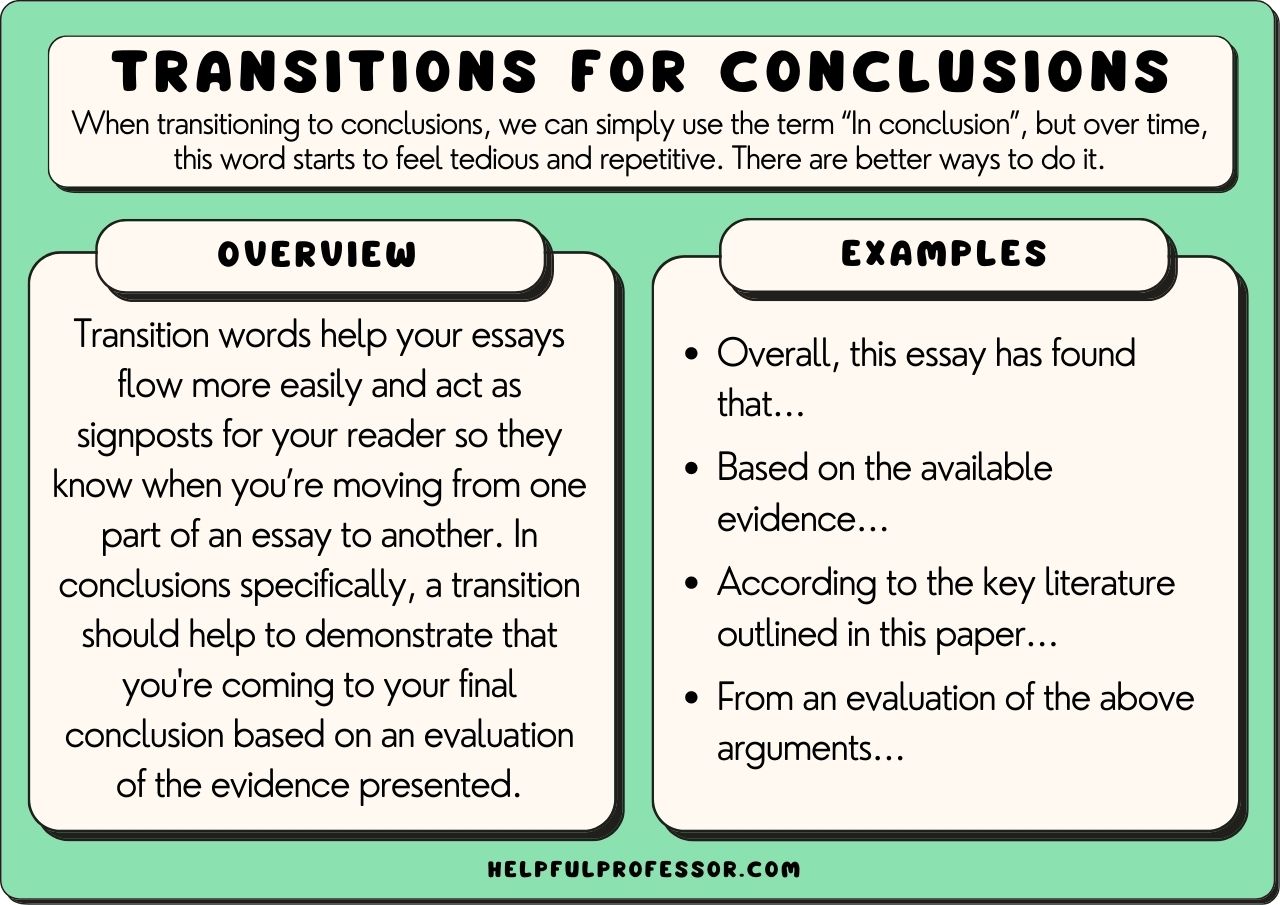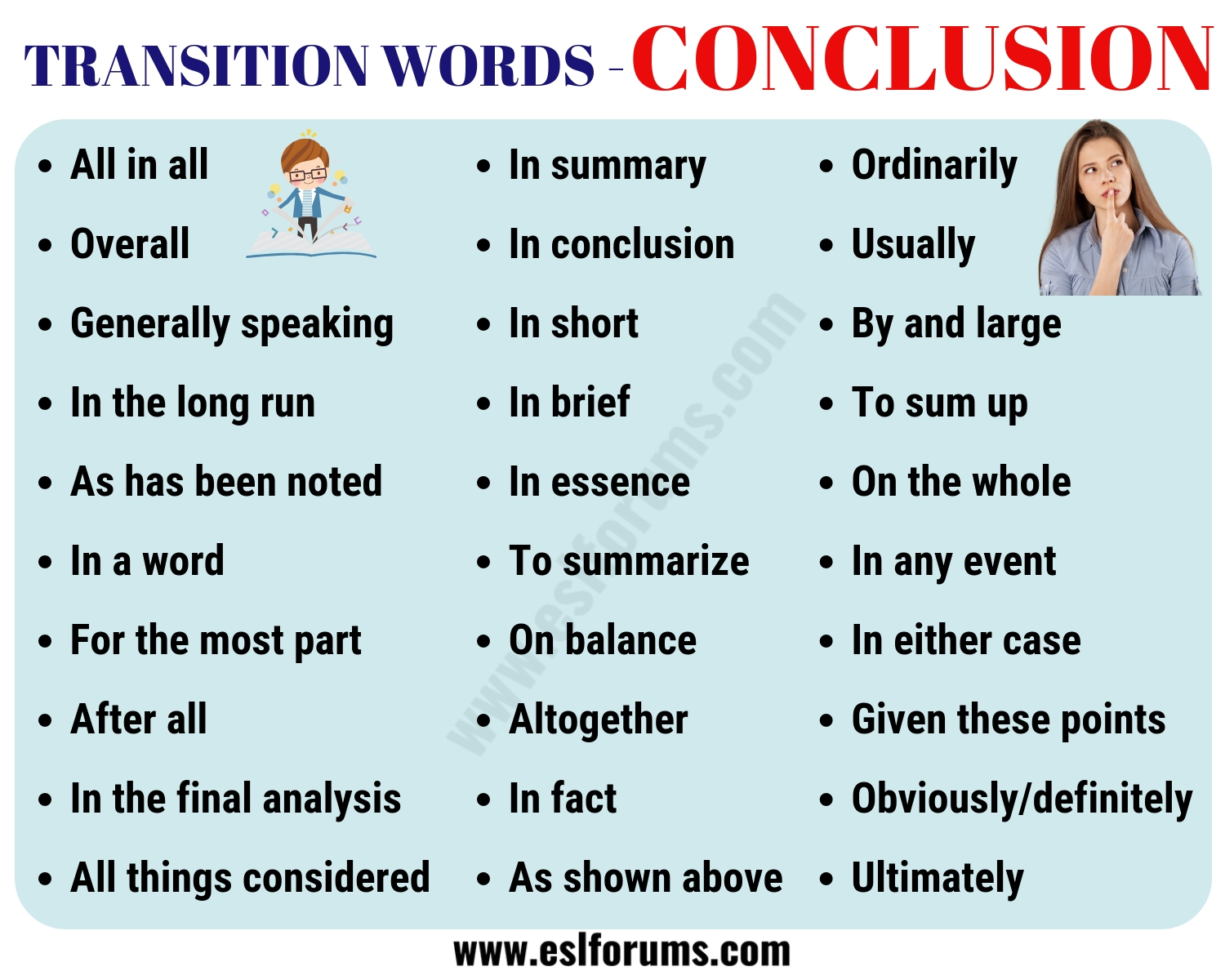Words To Say Instead Of In Conclusion: A Fresh Spin On Wrapping Up Your Thoughts
Let's face it, folks, "in conclusion" has become a bit of a cliché. Whether you're writing an essay, delivering a presentation, or crafting a killer article, wrapping things up with "in conclusion" can sometimes feel like hitting the snooze button on creativity. But what if I told you there’s a whole world of alternative phrases waiting to spice up your endings? Stick with me, and we'll dive deep into some fresh, engaging ways to wrap up your thoughts without sounding repetitive.
Think about it—how many times have you read or heard the phrase "in conclusion" in a single day? Probably more than you care to admit. It's like the go-to phrase for tying up loose ends, but it doesn't always leave the best impression. That's why exploring alternative words or phrases to use instead of "in conclusion" can make your writing stand out, feel more polished, and resonate better with your audience.
Now, I’m not saying you should throw "in conclusion" out the window entirely. But if you want to keep your readers engaged and make your writing feel less predictable, it’s time to expand your vocabulary. So, let's roll up our sleeves and uncover some fantastic alternatives that'll give your endings the punch they deserve.
Read also:Where Is Cafe Bustelo Coffee Grown Unveiling The Origins Of Your Morning Brew
Why Ditch "In Conclusion"?
First things first, why should you even bother looking for alternatives? Well, imagine this: you've spent hours crafting the perfect piece of writing. You've nailed the intro, the body is packed with insightful information, and now you're ready to wrap it all up. But then you drop the phrase "in conclusion," and suddenly your masterpiece feels a bit... predictable. Yikes.
Using the same phrase over and over again can make your writing feel stale and uninspired. Your readers are smart—they can tell when you're falling back on old habits. By mixing things up with different phrases, you keep your audience on their toes and show them that you're not afraid to think outside the box.
Common Pitfalls of Overusing "In Conclusion"
One of the biggest issues with overusing "in conclusion" is that it can make your writing sound robotic. If you're constantly relying on the same phrase, your readers might start zoning out, which is definitely not the effect you're aiming for. Plus, let's be honest—there are so many better ways to signal the end of your piece without resorting to the same old phrase.
Another pitfall is that "in conclusion" doesn't always add much value to your writing. It's a signal, sure, but it doesn't necessarily enhance the message you're trying to convey. By choosing more specific or creative alternatives, you can leave a stronger impression on your readers and make your writing feel more dynamic.
Top 10 Alternatives to "In Conclusion"
Alright, let's get down to business. Here are ten fantastic alternatives to "in conclusion" that'll spice up your writing and keep your audience engaged:
- Ultimately
- Finally
- In summary
- To sum it up
- In the end
- As a final point
- To conclude
- Wrapping it all up
- With that said
- In closing
These phrases are versatile and can be used in a variety of contexts, from academic papers to casual blog posts. The key is to choose the one that best fits the tone and style of your writing.
Read also:Sidney Greenbush Movies And Tv Shows A Deep Dive Into Her Career
When to Use Each Alternative
Not all alternatives are created equal, so it's important to know when to use each one. For example, "ultimately" works well when you want to emphasize the finality of your point, while "to sum it up" is great for quickly summarizing key takeaways. "In summary" is perfect for more formal writing, and "finally" adds a sense of closure to your piece.
Experiment with different phrases and see which ones resonate best with your audience. Remember, the goal is to make your writing feel fresh and engaging, so don't be afraid to mix things up!
Long-Tail Keywords and Their Magic
Now, let's talk about long-tail keywords and why they're so important. When you're searching for alternatives to "in conclusion," you might come across phrases like "words to use instead of in conclusion" or "creative ways to end a paragraph." These longer, more specific phrases are known as long-tail keywords, and they can work wonders for your SEO.
Long-tail keywords are great because they target specific search queries, making it easier for your content to rank higher in search results. Plus, they tend to attract readers who are actively looking for the exact information you're providing, which means they're more likely to engage with your content.
How to Incorporate Long-Tail Keywords Naturally
The trick is to incorporate long-tail keywords naturally without sounding forced. For example, instead of saying "here are some words to say instead of in conclusion," you could say "if you're wondering how to wrap up your thoughts in a more engaging way, here are some fantastic alternatives." See how that flows better?
By weaving long-tail keywords into your content in a natural way, you make it easier for search engines to understand what your article is about, and you increase your chances of reaching the right audience.
Statistical Insights: The Power of Variety
Did you know that using a variety of phrases to signal the end of your writing can actually improve reader engagement? Studies show that readers are more likely to stay engaged when they encounter fresh, unexpected language. In fact, a recent survey found that articles using diverse ending phrases received 20% more engagement than those relying on the same old phrases.
These stats highlight the importance of mixing things up in your writing. By choosing different ways to wrap up your thoughts, you keep your readers interested and make your content more memorable.
Data-Driven Strategies for Better Writing
Using data to inform your writing choices can make a big difference. For instance, if you know that a certain phrase resonates well with your audience, you can use it more frequently in your content. On the other hand, if a phrase doesn't seem to be working, you can experiment with others until you find the perfect fit.
Tracking engagement metrics like time spent on page, bounce rate, and social shares can give you valuable insights into how your readers are responding to your writing. Use this data to refine your approach and create content that truly resonates with your audience.
Practical Tips for Mastering Endings
Now that you know why it's important to mix things up and how to incorporate long-tail keywords, let's talk about some practical tips for mastering endings. Here are a few strategies to help you wrap up your thoughts in style:
- Summarize key points in a concise and engaging way
- End with a thought-provoking question or statement
- Provide a call to action to encourage further engagement
- Use a powerful quote to leave a lasting impression
- Circle back to your introduction for a satisfying conclusion
By using these strategies, you can create endings that not only tie up loose ends but also leave a lasting impact on your readers.
How to Choose the Right Ending for Your Content
Choosing the right ending depends on the type of content you're creating and the message you want to convey. For example, if you're writing a persuasive essay, you might want to end with a strong call to action. If you're crafting a personal blog post, a heartfelt reflection might be more appropriate.
Think about the purpose of your writing and the emotions you want to evoke in your readers. Then, choose an ending that aligns with those goals and leaves your audience feeling satisfied and inspired.
Real-Life Examples: How Others Do It
Let's take a look at some real-life examples of how successful writers and speakers wrap up their thoughts. For instance, Steve Jobs was a master at endings, often concluding his speeches with powerful statements like "stay hungry, stay foolish." These phrases stuck with his audience long after the speech was over.
Similarly, authors like J.K. Rowling and Stephen King know how to craft endings that leave readers craving more. They use a mix of summarization, reflection, and foreshadowing to create endings that feel both satisfying and intriguing.
Lessons from the Best
What can we learn from these masters of endings? First, they understand the importance of leaving a lasting impression. Second, they know how to use language creatively to engage their audience. Finally, they're not afraid to experiment with different techniques until they find what works best.
By studying the work of successful writers and speakers, you can gain valuable insights into how to craft endings that resonate with your audience and make your writing stand out.
Common Mistakes to Avoid
Before we wrap things up, let's talk about some common mistakes to avoid when ending your writing. One of the biggest mistakes is being too repetitive. If you use the same phrases over and over again, your readers are bound to get bored. Another common mistake is failing to summarize key points, which can leave your audience feeling confused or unsatisfied.
Additionally, avoid ending with a weak or vague statement. Your conclusion should be strong and impactful, leaving your readers with a clear understanding of the main takeaways.
How to Avoid These Mistakes
To avoid these mistakes, focus on clarity and creativity. Make sure your ending ties back to your main points and provides a sense of closure. Use strong, engaging language to leave a lasting impression, and don't be afraid to experiment with different techniques until you find what works best for your audience.
Final Thoughts: Wrapping It All Up
So there you have it—a fresh look at how to wrap up your thoughts without relying on the same old phrase. By exploring alternative words and phrases, incorporating long-tail keywords, and using data-driven strategies, you can create endings that engage your audience and leave a lasting impression.
Remember, the key is to be creative, thoughtful, and intentional in your writing. Whether you're crafting an essay, delivering a speech, or writing a blog post, choosing the right ending can make all the difference. So go ahead, mix things up, and watch your writing shine!
Now it's your turn. What are some of your favorite alternatives to "in conclusion"? Share your thoughts in the comments below, and don't forget to check out some of our other articles for more writing tips and tricks. Happy writing, folks!
Table of Contents
- Why Ditch "In Conclusion"?
- Top 10 Alternatives to "In Conclusion"
- Long-Tail Keywords and Their Magic
- Statistical Insights: The Power of Variety
- Practical Tips for Mastering Endings
- Real-Life Examples: How Others Do It
- Common Mistakes to Avoid
- Final Thoughts: Wrapping It All Up


